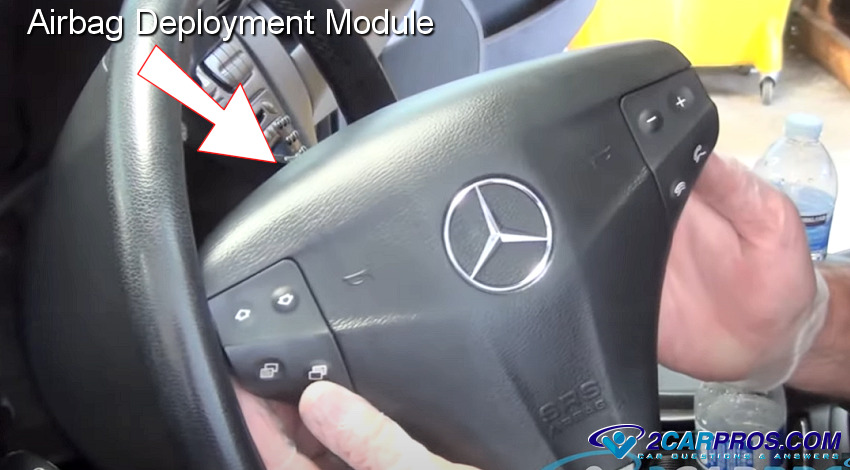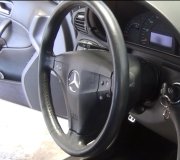You didn't list any reason this part is needed or the problem you're having, so I can only offer that everything in air bag systems has a lot of safeguards built in. The rocket fuel pellet in the air bag assembly can be ignited with a small 9-volt transistor battery, which is what we do for demonstrations. Any time you slide across the seat fabric, or walk across a carpet, and see or feel a shock from your fingertip, that is at least 3,000 volts of static electricity. That is way more than enough to light off an air bag.
The circuit that runs from the Air Bag Computer up to the air bag on the steering wheel is called the "initiator" circuit, or the "squib" wire. As long as that remains plugged in, it is immune from static discharges. It's when any connector is unplugged that the resulting "open circuit" leaves it susceptible to that static electricity. The engineers are well aware of that. To prevent that, every connector has a shorting bar in the half on the air bag side. It is pushed out of the way when the connector is plugged in. When it is disconnected, that shorting bar drops down to touch the two terminals together. Now, if they're hit with a static shock, the exact same voltage will be seen on both wires. The difference between them is 0 volts, so nothing happens. The air bag is rendered safe from accidental deployment.
All connectors in this initiator circuit are bright yellow, including the large one at the computer. Computers are often referred to as "modules", or "computer modules". To add to the confusion, the air bag on the steering wheel can also be referred to as a module. I call them an "assembly" to avoid that confusion.
The air bag on the steering wheel only needs to be replaced after it has deployed in a crash. One notable exception is when the horn switch is built into its cover, and that switch fails. Technically, that's a horn problem, not an air bag problem. In that case, the shorting bar allows us to simply unplug the assembly and plug the new one in. That must be done with the ignition switch off to prevent setting confusing diagnostic fault codes.
The Air Bag Computer is supposed to be replaced as part of crash damage repair, along with all of the crash sensors. Circuitry inside the sensors will tell the computer those sensor circuits are okay and working properly, including after crash repair. There is a spring-loaded movable contact that trips in a crash of at least a minimum speed. There is another internal crash sensor inside the computer called the "safing sensor". That one and at least one external sensor must both activate at exactly the same time for the computer to deploy the air bag. A small amount of arcing occurs at the point where those contacts touch. Once the sensor switches off a fraction of a second after the crash, it again will appear to the computer to be okay, but there is no way to detect that arcing that has occurred to the contacts. The fear is the next time that sensor needs to report an impact, the contacts will be blocked by that arced area and will fail to send the crash signal at the exact instant it is needed. The same is true of the safing sensor. That is why, for liability protection, all crash sensors and the computer must be replaced after a crash.
If the air bag assembly on the steering wheel is being replaced after deployment in a crash, the "clock spring" must be replaced too. That is a wound-up ribbon cable inside a plastic housing, under the steering wheel. In the past we used a brass spring-loaded contact and a sliding brass ring to make the movable contact for the horn switch. Those worked well enough for the horn, but air bags are timed to within a few milliseconds to offer proper protection. A sliding contact can't be relied upon to have a solid connection at the instant it is needed, so a hard-wired ribbon cable is used instead. There's a two-wire connector coming out of the clock spring's housing that connects to the air bag. When the air bag deploys, a lot of heat is generated by the burning rocket fuel. That heat almost always melts the connector. Even if an uninformed do-it-yourselfer was able to get that connector plugged into the replacement air bag, being melted and deformed, that connector is likely to bend or damage the shorting bar in the assembly. That can prevent the shorting bar from touching both terminals in the connector when that air bag is unplugged in the future, and that can lead to accidental deployment
Air bags that didn't deploy in a crash can be reused, but these are the reasons sensors, computer modules, and the items with connectors for any deployed bags are replaced as part of conscientious crash repair.
It should also be noted that a lot of cars have gone away from using crash sensors and they rely solely on the safing sensor inside the computer. On cars with external sensors, any one of them and the safing sensor must activate at exactly the same time, and it takes a minimum speed for that to occur. To achieve that, sensors and the computer must always be mounted at the angles and orientation they were designed to be in. If any are tipped or turned, they won't activate at the right times.
Service manuals always include safety warnings to disconnect the battery and wait at least two minutes for the capacitors in the computer to discharge. Those capacitors hold enough of a charge to insure the computer can deploy the air bags in a crash after the battery cable has been severed. The problem is there's a lot of manufacturers that have devised tricks to force you to go back to the dealer to have multiple computers unlocked after the battery is reconnected. Because of those tricks, disconnecting the battery should be avoided. Remember, it's the static electric discharge that can accidentally deploy a disconnected air bag, but only if the shorting bar is damaged. A disconnected battery doesn't have anything to do with that and won't protect against static discharge.
Here's links to some related articles that can provide more information:
https://www.2carpros.com/articles/symptoms-of-a-bad-airbag-clock-spring
https://www.2carpros.com/articles/air-bag-removal-steering-wheel
https://www.2carpros.com/articles/steering-wheel-removal
https://www.2carpros.com/articles/steering-wheel-clock-spring-removal
Wednesday, January 22nd, 2020 AT 2:54 PM





